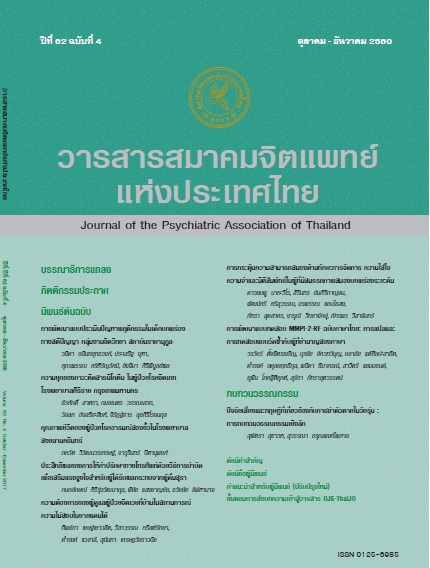ผลตอบรับจากครอบครัวเกี่ยวกับคุณสมบัติของทีมสะท้อนกลับในครอบครัวบำบัด โรงพยาบาลรามาธิบดี
Main Article Content
Abstract
Objective : To examine reflecting team’s qualities that families perceived as useful
qualities in family therapy at Ramathibodi Hospital, Bangkok, Thailand.
Methods : This descriptive study enrolled all clients attended family therapy using
reflecting team (RT) approach at the family clinic, Ramathibodi Hospital from August
2016 to July 2017. The clients were asked to fill out the RT feedback questionnaires
shortly after their therapy sessions were finished. Data were analyzed by descriptive
statistics, ANOVA and post hoc tests for multiple comparisons.
Results : A total of 28 clients from 11 families participated in this study. Most participants
were female (71.43%). All participants aged 14-70 years (median 36.50 years, IQR
27.00-54.25 years). Genuineness and having good intentions were perceived as the
strongest strengths of the RT (3.51 ± 0.82 scores). The participants reported that helpful
reflections could help them understand themselves, their families, and their problematic
situations 45.65%, contained useful comments and advice 10.87%, and reflected their
strengths 6.52%. The subgroup analysis that divided all participants’ responses into
3 groups by numbers of therapy sessions showed that ability to communicate effectively
had significantly higher scores in the group of participants who attended 4 or more
therapy sessions than the group of participants who attended 1-3 sessions (3.73 ± 0.47
VS 3.00 ± 0.48, p <0.0001).
Conclusion : The RT approach in family therapy was useful and compatible with Thai
culture. The clients’ feedback revealed that better understanding regarding their family
situations was the most important part in reflecting processes.
Article Details
Articles submitted for consideration must not have been previously published or accepted for publication in any other journal, and must not be under review by any other journal.


